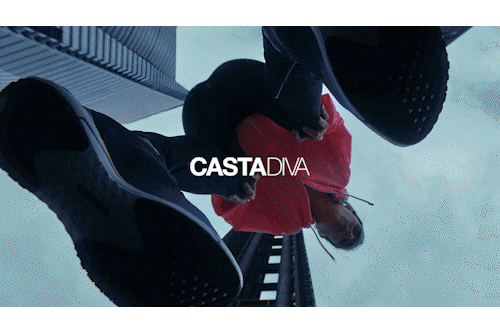
Enter the Soft, Dark and Imperfect World of Anna Mantzaris

According to Buddhism, life is suffering. That may be true but life is also funny. That blend of bleakness and humour weaves its way through the ‘simplified reality’ of Swedish director and animator Anna Mantzaris. Her stories unfold in lowkey, muted toytowns as soft, felted characters deal with emotions like guilt, awkwardness and frustration. Her wry observations and the tangible inner turmoil lying just below the surface of her fuzzy folk have found an audience – Anna’s films have been successful on the animation festival circuit and her 2018 film ‘Enough’ was singled out as the Vimeo Staff Pick of the Year. That’s right. Of. The. Year.
Anna recently graduated from the Royal College of Art with an MA in animation – six months ago she joined the roster at Passion and she’s already been working on exciting brand projects, such as the Greenpeace France Christmas film. And – super excitingly – she was also part of the animation army that worked on Wes Anderson’s Isle of Dogs.
LBB’s Laura Swinton caught up with Anna – who turns out to be surprisingly less melancholic than her work suggests. She does, though, have a great sense of humour,
LBB> What’s your earliest memory of animation?
Anna> I remember watching The Lion King over and over on VHS as a kid. We didn’t have that many films to choose from, so my sister and I just watched the Lion King on repeat for ages.
LBB> And what were your first experiments like?
Anna> Although I have always drawn a lot and created things by hand, I was never into animation when I was a child. I never even considered doing animation until I applied to my BA in animation. Then I did a few very quirky animation tests to apply with. One was of a very creepy looking woman made in textile and wool, who was smoking and listening to a gramophone player. It was stop motion, but I didn’t know anything about stop motion back then so the animation was really bad. But since I didn’t know, I didn’t mind! For the application I also made a self portrait made from food and objects that were animated on a table.
LBB> I’m curious about the culture of animation in Sweden – is there something distinctly Swedish about the local animation scene or the sorts of things you grew up with (in the way that, say, French 2D animation is super distinctive)? Is there a lively scene?
Anna> I didn’t grow up with that much Swedish animation, to be honest. There is one filmmaker Per Åhlin, who did some really beautiful films that went on to become Swedish classics. I think both in film and animation in general, there is a bit of Swedish/Scandinavian mood that is easy to spot. A bit slow and grey, with a dry (but very funny) sense of humour. It’s the opposite of an action film with slapstick humour.
I would not say that the Swedish indie animation scene is extremely lively, and there are not that many bigger projects being made. But there are a few, there is Niki Lindrith VonBahr whose work is amazing and she is doing very well. And there are some children’s films being made. But most of the animation scene in Sweden I would say is more focused around video game animation and VFX.
LBB> How did you end up developing your approach and aesthetic you like to work with? How would you describe it?
Anna> I have always liked imperfect characters. I think that has gone through all of my work since the beginning, even though the style has varied a little bit. I like characters that look how you feel on a bad day, and I’m interested in awkward characters who are sad and funny at the same time. We had tried a bit of wool and needle felting even in my first film ’But Milk is Important’, and my mother has always made felt animals for the kids at her kindergarten since I was small. We also discover some other fantastic works in similar materials like ‘Oh Willy…' whose look really inspired me.
But most of all, I just like the benefits of it a lot - and it’s both easy and cheap. It creates some softness and warmth. I just really enjoyed working with it. Saying that, I still like to try materials and methods and not be locked to one particular technique.
I like things that are not too cluttered, so I much prefer to go for a simpler style than the classic stop motion style that uses a lot of details and quirky angles. And I like to keep more of a minimalistic colour palette than what would be realistic.
I think I would describe my style as ’simplified reality’.
LBB> There’s a strange juxtaposition between the softness of the characters and the bleakness or darkness of some of the themes you explore, for example the inner rage of Enough, the creepiness of Good Intentions or the awkwardness of But Milk is Important – what is it about these themes that appeal to you? And why do you enjoy putting them together with this soft, felt look of the characters?
Anna> I just love the combination of something softer and sympathetic, with something darker. I find it hard not to add both something dark or sad, and some humour when I do a project. Sometimes there’s just a little, sometimes there’s a lot.
Something that doesn’t have any element of darkness would not feel realistic for me. And something that doesn’t have a little bit of humour would be less fun to work with, and to show to other people.
I also think it disarms the audience a bit when you tell a dark story with some humour, it just works better for me. It becomes less pretentious and also easier to take in.
LBB> In particular, you say that you like things that are ‘sad and funny’ at the same time – is this dry, melancholic humour something that runs quite deep in your personality - or does that all go into your work, leaving you a bit more chipper?
Anna> Haha - I dont think it runs in my personality, I’m a very non-melancholic person. But it just interests me a lot. And that’s the type of humour I like to watch in other films as well. I don’t know if it makes me feel better working with it… maybe it does.
I’m interested in human behaviour, and for me it feels very close to that. I just find there’s something very human about it, the combination of sad and funny. That’s life - sad, sometimes dark, but also funny, at the same time.
LBB> You worked on Isle of Dogs! What was that experience like and what did you learn from it?
Anna> It was very fun. I was doing some animation and I really enjoyed it. I went there before I had finished ’Enough’, just for a period of time. And then I went back to finish ’Enough’ after. And it’s such a contrast, going from doing almost everything on ’Enough’, now I was just one person among almost a hundred. But it was amazing to be around all those beautiful sets, puppets and animation. I like Wes’ style as well, so as a filmmaker it was very inspiring to be in that environment for some months, and watch things from the other side of the screen.
LBB> How long have you been with Passion?
Anna> I joined Passion last summer, so around six months. It’s really nice with all the support I get from them, so I’m really enjoying it!
LBB> We loved your French Greenpeace ad this Christmas – what was it about the idea that appealed to you? And how do you choose what commercial projects you want to work on?
Anna> Thank you! First of all I love Greenpeace, I think they do so much good for our planet. So I really wanted to work with them. And I really liked the idea of making it a christmas commercial; I felt like it was different and also had a strong message. In this case they had seen Enough and approached me straight away, so it was great for me. This was also my first project with Passion.
Normally I would see if the story appeals to me, and if it feels like a fun and creative project.
And also if there is time and budget to make the project without being burned out. I’m not the best with time planning, I’m quite time-optimistic, so I’m very happy to have Passion to help me with that part, hehe.
LBB> Good Intentions is hitting the festival circuit – what can you tell us about it?
Anna> Yes! Good Intentions is my graduation film from the Royal College of Art. The story is about a young woman who is responsible for a hit and run. She feels very guilty and wondering what happened to the other driver… and soon some strange and spooky things starts happening to her.
The film got an award at the London International Animation Festival before Christmas, and has been selected in some really nice festivals so I’m very excited about that. I was a bit slower to get it out there because I didn’t finish it completely until September, and the months after that I was really busy.
LBB> Enough is so relatable! Of all the minor annoyances that grate on your nerves, which one is most likely to make you snap?
Anna> Haha! I bet there are a lot of things if I start thinking about it. I don’t know if I’m the person that would snap, I’m too shy. But I get really annoyed when people try to get on the tube when there are clearly people that are trying to get off first. Nothing is going to get faster if you just push yourself in and don’t let people out first. I’m also allergic to too much manspreading in crowded areas, someone sitting next to you and spreading their legs as wide as they can and you have to squeeze in your legs in the corner. If I have the energy I normally push back with my leg and claim the space.
I don’t relate so much to jumping out of the car. But when I was doing research for Enough, I found out it was a thing that a lot of people had. There were internet forums about it, so decided to include it anyway because I think it’s quite funny.
LBB> Who are your animation heroes and why?
Anna> I love the work of Niki Lindroth VonBahr, I think her work is so subtle and funny. I like the style of Marc and Emma a lot too. Another short I watched recently is Cat Days by John Frickey, which I really enjoyed! There are a lot of amazing animation filmmakers out there!
LBB> Outside of animation what inspires you?
Anna> A lot of things. I watch many films and that inspires me a lot, maybe even more than watching animation. I go to exhibitions, for sure, and see a lot of art in general. I also like observing people and human behaviour.















